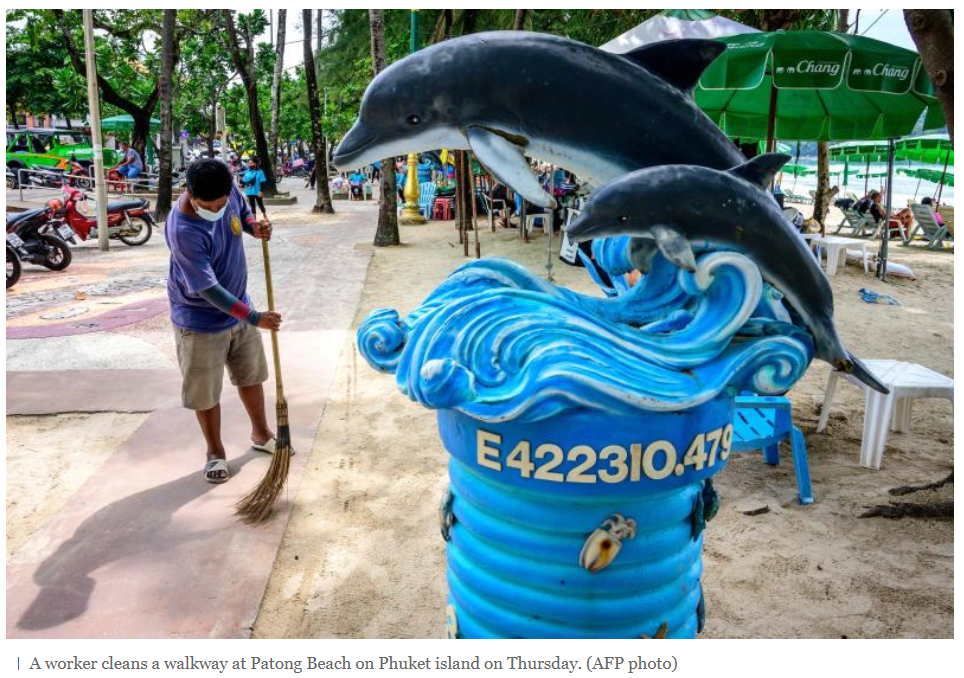Thailand: Rules for travellers clarified
The Department of Consular Affairs and the Tourism Authority of Thailand have clarified rules governing international arrivals when the country opens on Monday.
Travellers will be categorised into three groups, according to Naruechai Ninnart, director of the Protection of Thai Nationals Abroad Division, Department of Consular Affairs.
The first are fully vaccinated visitors from 46 countries (www.thaiembassy.com). They must stay one night in either a Safety and Health Administration Plus (SHA+) certified hotel or an alternative quarantine hotel for a RT-PCR test and wait for the result.
“They can travel anywhere in Thailand if the result is negative,” Mr Naruechai said.
The second group is fully vaccinated visitors from countries not on the list of 46. They must stay in SHA+hotels for seven nights in a “sandbox” area, he said.
The sandbox scheme will be expanded from Phuket to cover 17 provinces in total, starting on Nov 1, including Bangkok, Chiang Mai and Krabi. (Some provinces are limited to some districts.)
“If visitors pass the second Covid-19 test [on Day 6 or 7], they can travel anywhere in Thailand after completing seven nights in the sandbox area,” he said.
The third group is unvaccinated or not fully vaccinated travellers. They are required to stay in alternative quarantine hotels for 10 nights. When they pass the second Covid-19 test on Day 8 or 9, they can travel to other places in Thailand.
CoE vs Thailand Pass
Before arriving, foreign travellers must apply for a Thailand Pass which will be introduced on Nov 1 at 9am (local time) to replace the Certificate of Entry (CoE). A portal site (https://tp.consular.go.th) is where visitors need to submit required documents including a vaccination certificate and medical insurance with minimum coverage of US$50,000 (about 1.6 million baht).
“Thailand Pass will be a quicker verification process than CoE but it still requires one to seven days before the Thailand Pass QR code can be issued to applicants,” Mr Naruechai said.
The approval process will be quick if vaccine certification is in the digital format, he said.
It means travellers who want to fly to Thailand on Nov 1 or until Nov 7 still need to apply for a CoE.
Travelling with children
Children under 12 travelling with their parents are not required to have a vaccine certificate. If the parents are fully vaccinated and have a certificate, the certificate also covers their kids, Mr Naruechai said.
For children older than 12, a vaccine certificate and medical insurance are required.
Medical insurance
At the moment, only Thai nationals are not required to have medical insurance as their medical costs will be covered by the National Health Security Office or Social Security office.
“We will work with the Public Health Ministry and the Centre for Covid-19 Situation Administration [CCSA] to extend the exemption to foreign residents who already have medical insurance in Thailand,” Mr Naurechai said.
For foreign travellers, they have to make sure that their insurance policy does not only specify Covid-19 health coverage. It should cover other kinds of sickness as well as hospitalisation expenses.
The CCSA will meet today to discuss the health insurance exemption issue for foreign residents. It should be effective hopefully before Nov 1, he said.
Visitors from 46 countries
Fully vaccinated visitors from the 46 listed countries are required to have stayed at least 21 days in one or more of those countries before travelling to Thailand.
They can stay 10 days in the US, for example, another 10 days in France and one day in Hong Kong. The total is 21 days, then they can fly to Thailand, Mr Naruechai said.
For fully vaccinated Thais and foreign residents who travel to one of the 46 countries for a shorter period of time such as for a three-day meeting, they are not required to spend at least 21 days in the eligible countries.
The exception will not apply to Thais or foreign residents who visit other countries that are not on the list of 46 eligible countries, he said.
For transit passengers going through other countries that are not on the list, they can continue their journey to Thailand if the transit period does not exceed 12 hours and if they do not leave the airport.
When in Thailand
During the initial phase, visitors can enter Thailand through six international airports in Bangkok, Chiang Mai, Phuket, Samui and Rayong (U-Tapao airport). Buri Ram airport is only open to charter flights.
Visitors must show a negative RT-PCR test result issued within 72 hours before travelling together with the Thailand Pass QR code to a Department of Disease Control official and Immigration officer.
They also need to download and register with the Mor Chana application. The app will require them to evaluate their health condition daily while in Thailand.
From the airport to the hotel, they must travel in SHA+ vehicles, not in a normal taxi.
“They must travel via a sealed route from the airport to the hotel,” Mr Naurechai said.
The hotel will work with a hospital to provide the RT-PCR test.
“Price ceilings for RT-PCR tests will be announced so that the service fee will not be much different from those in other parts of the country,” he said.
Fully vaccinated Thai and foreign residents cannot quarantine in their homes for the first night in Thailand. They must stay in a hotel until they get their RT-PCR test result.
They can leave the hotel when the test result is negative. If the result is positive, they will be sent to a hospital or a quarantine hotel, Mr Naurechai said.


 English
English









